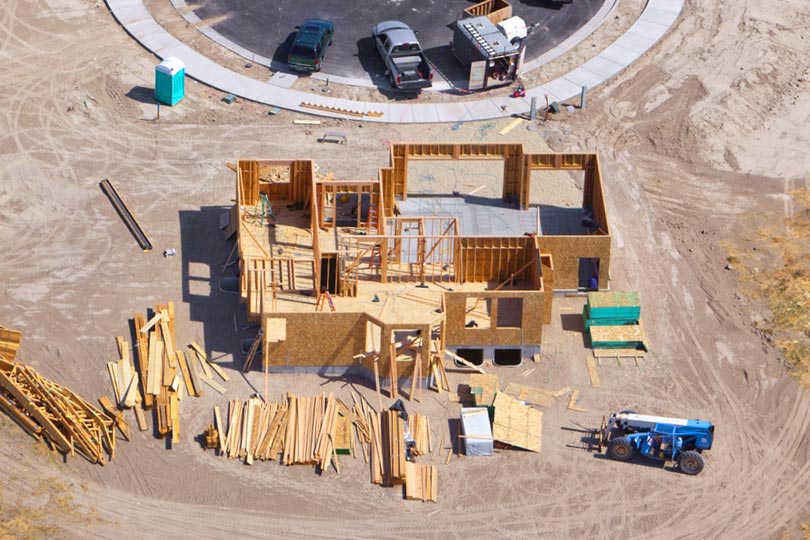Building Your New Home In 2023

As conditions slowly begin to improve for house hunters (remember it was a seller's market in 2022) many will feel more encouraged to consider building a home, whether it's a first-time home buyer looking for their first property or an experienced homeowner looking for a bigger, better home.
There are considerations to make in either situation. Building a home should include long-term planning.
Building A Home Versus Renting One
It’s a lot different than the process you use to select an apartment or other types of rental property; think about your circumstances now compared to where you see yourself five or 10 years down the line and it's easy to see why you should plan ahead when building your house.
Changes in careers, the size of your family, and even the climate where you currently live may play a part in your decisions to keep or sell the home later on. Anticipating those circumstances when planning your home loan is important.
When building your first home, consider a design you can grow into rather than out of unless you know that you’ll be relocating in a few years and the property you are buying now is basically a “starter home”.
Paying More Up Front?
It makes little sense to invest in a larger down payment or to consider paying for points to lower the interest rate. If you build a home knowing you may sell it in a few years, consider your options to save as much money upfront on the loan.
Building a quality home is naturally a priority but you also want to avoid over-investing in a house you know you won’t be keeping.
What about those who plan to stay in the home long-term? A bigger down payment and a lower interest rate can save you money over the full term of a One-Time Close construction loan.
And when you are choosing the fixtures and other features of the home, be sure to make choices you can live with for a long time.
Quality in these cases is more important--you will be using these furnishings and fixtures for some time to come.
Sometimes the choice of location makes a difference. Do you know if your new neighborhood is subject to mudslides, wildfires, or floods? If you plan to stay in a community for a long time, it’s a good idea to know whether any natural disaster issues are waiting for you as a long-term resident.
Consider the location of your new home carefully, It's a decision just as critical as the size and configuration of the property.
Want More Information About One-Time Close Loans?
We have done extensive research on the FHA (Federal Housing Administration) and the VA (Department of Veterans Affairs) One-Time Close Construction loan programs.
We have spoken directly to licensed lenders that originate these residential loan types in most states and each company has supplied us with the guidelines for their products. We can connect you with mortgage loan officers who work for lenders that know the product well and have consistently provided quality service.
If you are interested in being contacted by a licensed lender in your area, please send responses to the questions below. All information is treated confidentially.
OneTimeClose.com provides information and connects consumers to qualified One-Time Close lenders to raise awareness about this loan product and to help consumers receive higher-quality service.
We are not paid for endorsing or recommending the lenders or loan originators and do not otherwise benefit from doing so. Consumers should shop for mortgage services and compare their options before agreeing to proceed.
Please note that investor guidelines for the FHA and VA One-Time Close Construction Program only allow for single-family dwellings (1 unit) – and NOT for multi-family units (no duplexes, triplexes or fourplexes).
In addition, the following homes/building styles are not allowed under these programs: Kit Homes, Barndominiums, Log Cabin Homes, Shipping Container Homes, Stilt Homes, Solar (only) or Wind Powered (only) Homes.
Contact Us: Send Us Your Request – Spam Safe
Please send your email request to [email protected] which authorizes OneTimeClose.com to share your personal information with one mortgage lender licensed in your area to contact you.
1. Send your first and last name, e-mail address, and contact telephone number.
2. Tell us the city and state of the proposed property.
3. Tell us your and/or the Co-borrower’s credit profile: Excellent – (680+), Good - (640-679), Fair – (620-639), or Poor- (Below 620). 620 is the minimum qualifying credit score for this product.
4. Are you or your spouse (Co-borrower) eligible veterans? If either of you is an eligible veteran, down payments as low as $0 may be available up to the maximum amount your debt-to-income ratio per VA will allow – there are no maximum loan amounts as per VA guidelines. Most lenders will go up to $1,500,000 and review higher loan amounts on a case-by-case basis. If not, the FHA down payment is 3.5% up to the maximum FHA lending limit for your county.
Do you know what's on your credit report?
Learn what your score means.

July 26, 2024The Federal Housing Administration (FHA) offers qualifying borrowers the option to build a home from the ground up using a Single Close FHA Construction Loan. This program, also known as a One-Time Close construction mortgage, allows borrowers to finance the construction of a new home and convert it into a permanent mortgage with just one closing, streamlining the often complex process of building a house.
July 19, 2024VA One-Time Close construction loans help qualifying veterans build homes they will own and occupy once the construction phase is complete. One-time close loans, or construction-to-permanent loans, combine construction and permanent financing into a single closing procedure. VA One-Time Close mortgages have no VA-required down payment or mortgage insurance, making them attractive options for qualifying borrowers.
July 12, 2024When planning a construction loan, you have many options. For example, do you want to buy land with a loan to build the house? Or do you already own a parcel suitable for the construction project? There are many other choices to make with home loans, but some don’t necessarily apply to construction mortgages.








